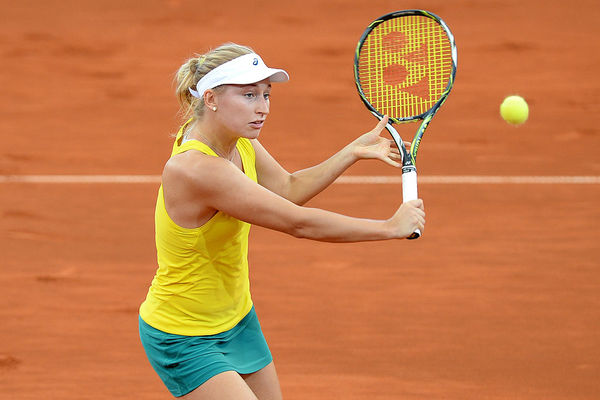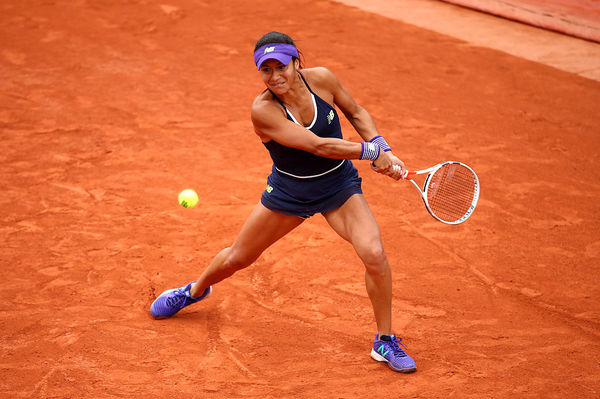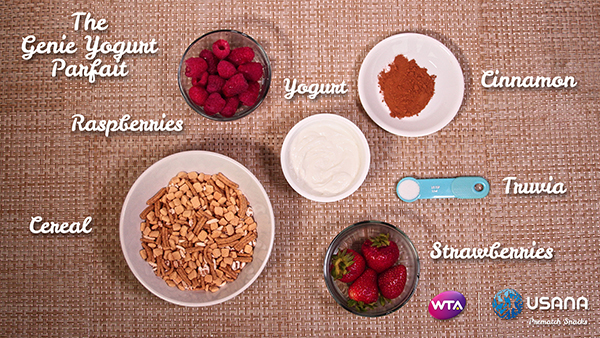ROME, Italy – In March, BNP Paribas Open tournament director Raymond Moore stepped down after making controversial statements about the merits of equal prize money at the tour’s combined events. A few days later, WTA founder Billie Jean King and Chris Evert held an impromptu press conference at the Miami Open, which delved deep into the history of the fight for equal prize money at the Slams. At the Mutua Madrid Open, tournament owner Ion Tiriac expressed his concerns over whether equal prize money was a sustainable business model for combined events.
The debate over equal prize money, which was achieved at all four Slams nearly a decade ago, simply has not gone gone away.
With that in mind, WTA CEO Steve Simon joined the Insider Podcast to weigh in on the current debate. A full transcript of the discussion is below. You can also listen to our talk on this week’s podcast.
WTA Insider: To start the discussion, does it surprise you that equal prize money has become this topic that still is debated and discussed at length pretty consistently?
Simon: Yes. Tennis, overall, has done a terrific job of addressing equal prize money. With the leadership of the Grand Slams and the main mandatory-combined events, which have led the way, I think tennis has addressed it very well. You can always do more, of course, but it has been addressed, and they deserve a lot of credit for the leadership shown in doing it. I think we’re farther ahead than many people when they get into the areas of compensation and equality and those types of things.
That being said, the fact that the conversation comes up is disappointing, to say the least. It’s a conversation that’s been done; the agreements are in place for it, and I think we should be embracing it as opposed to talking about it. I don’t think we need to be talking about it; we need to be talking about how we can do it more, and expanding it across all of our events and things like that, which we still have work to do in that space.
The comments that came out of Madrid were certainly disappointing, because Madrid was one of the leaders in this process, and signed up and agreed as a Mandatory event sanction to support equal prize money – and they have. We fully expect them to continue showing that leadership, and supporting it going forward. But obviously, there’s issues still to address.
WTA Insider: It comes at a time when two of the three Premier Mandatories have gone on, Indian Wells, Madrid and Miami, where you have tournament leaders coming out and saying that there is a frustration with respect to the agreement to pay equal prize money. My understanding of that is that it is being driven by almost an arms race between the sport’s biggest tournaments, whether it’s the Slams or the Mandatories and the ATP Masters. From your perspective – now you’re with the WTA, but you’ve spent the time on the tournament side – where is this coming from? Where is the frustration from the tournament side, and why do you think that it keeps getting aired out?
Simon: Well, I think that it’s percolated on two fronts. One is that the two tours, ATP and WTA, have different operating structures, and different economic bases that they work from. We deal with our members in different ways.
The factual [basis] is that the TV revenues, broadcast revenues from the ATP side, are higher than what we receive from the WTA side right now. The WTA has signed a new broadcast agreement that starts in 2017 that closes the gap dramatically, but still there’s a lot of work to be done. That’s something we need to address and continue working on, because those are economics and they do make a difference, and this is business.
But the issue of equal goes way beyond one element of broadcast agreements. The WTA and the ATP at these combined events are both contributing to that brand and that product, and is being promoted as that brand and that product. So, equal goes way beyond one element (television revenue) which is being pointed out. I think it’s a function of, one, the issues associated with different financial models, which are coming from the two tours, and I think that the recent increases in prize money – which were exorbitant – that the ATP recently put into place, has exacerbated the entire situation and has raised angst, because obviously a very high prize money increase will be multiplied by two. We certainly respect it, but we still need to show the leadership and protect equality. We won’t go anywhere but there.
WTA Insider: In the United States this is a discussion that extends outside of tennis. It’s a big talking point within US Soccer as the women are trying to renegotiate their pay scale, and one of the big questions that keeps coming up is about the free market. Revenues should always dictate back-end compensation, it’s been argued. I’ll pose that to you: how important is revenue on the back end, and should it be a 1:1?
Simon: As I said before, this is business and revenues are like oxygen, which allow you to breathe in business. So they’re very important, and equality isn’t an entitlement. It needs to be earned, and you need to do your job and invest into it.
As I said earlier, we’re having a tendency to pick just one element of the equation, and if you think about it, the Mutua Madrid Open, as an example, is promoted as a combined WTA/ATP event. They are driving all of the values that they’re realizing through that event, ticket sales, hospitality sales, all of the different things. The only things that’s different is broadcasting because those are two separate agreements that have completely different compositions – so they’re not equal.
You have to look at the whole package in totality, and when you have both the WTA and ATP contributing in the same manner to that final product, and the draws are the same, they’re playing the same, they should be compensated in the same way. You can’t just pick on one element, so it’s not a true 1:1 because there are many more elements to play into that.
WTA Insider: Rome is a Premier 5 tournament, not a Mandatory tournament. On the men’s side, it’s a Masters event. You see a similar situation in Cincinnati and Canada, as well. A New York Times article came out a few weeks ago arguing that these events should also be equal prize money, which they’re not, because they’re currently of different sanctions. I’m curious as to what your response is to that, and whether the way the WTA’s Premier structure is, with three different levels, does that create some level of confusion as to the levels of these events?
Simon: I have a couple of comments on that. First, you’re absolutely right that they are different levels, and we have different tier levels at the same event. And when I said we have work to do, this is some of the work we have to do because we have those events and the minimum prize money for each of those are different, and you can’t just ask them to all of a sudden jump up a category because that’s not what they signed up for. So we have some work to do to try to get that closer together.
I can say that we have some of those events in that category that have actually indicated an interest in trying to get to equal prize money. So there’s great leadership being shown there and I think it’s the right thing to do because again, they’re seeing both the men’s and women’s product contributing to that tournament’s brand and all of the ticket and sponsorship sales – everything that they do is because it’s a combined event. It’s really just a couple of elements that we need to improve upon.
We also have events where the WTA pays more than the men, like Beijing, where we have the higher tier event and they have a lower tier event. You have those in our game right now because we’re two separate tours with separate structures.
I think long term, we have work to do, and hopefully – I’m not saying whether it can or can’t be done – but I’m certainly one for working with everyone, versus just working on our side. Is there a way that we can work closer with the ATP and get closer in the alignment of our sanction levels, so that you can get to that naturally. I think it’s something that’s a little bit of a work in progress.
WTA Insider: I talked to a few players in Indian Wells, and they said equal prize money is an issue but for us the thing that affects our bottom line is the distribution of prize money from No.1 to 100, and making sure that a player ranked No.80-90-125 can make a living as a professional tennis player. You mentioned that that’s something you wanted to look at. Could you expand on why that’s important and how that’s possible to adjust?
Simon: The distribution of prize money is an on-going debate and discussion that’s been going on for years and will continue to. It’s the natural debate versus the value that should be received from winning a tournament versus getting into the tournament and not having the same success as the player who gets to the end of the tournament. Where should that value and most of the prize money go, especially when you’re playing 1-2 days and someone else is playing 5-6?
There’s clearly a natural progression where the end should get more than then beginning, but how much more and how should that be spread out? The overarching question is how do we continue to raise the compensation level, which means raising our business, so that at some of our lower tier events the prize money levels can get up higher and get to a level that makes things more sustainable for that player ranked No.30-100, which is where the challenges come from.
We need to do that, we need to figure out how can we get to where our players won’t be dependent on the four Slams to make their profit, and that they can make their living, earn their points, as a WTA player. The Grand Slams should be where they play for history, and all of the great things that come from making it into the Grand Slams and performing well. That’s something philosophically we have to work on, and it is something we’re working on with our structure right now, in discussions. It’s not something we’re sitting around waiting to discuss; we’re discussing it very heavily, and I think it’s a very important topic for us.
WTA Insider: How important is messaging to the players on that angle? One of the trends I’ve noticed over the last 5-6 years is that the more you talk to players, the more they talk about the Slams. WTA and ATP events are lead-ups to the big events. While I can understand the logic, the players don’t necessarily emphasize the importance of tour level events. How important is it to touch base with them and talk about the tour?
Simon: I think it’s very important. Since I’ve started, we’ve already had three different sessions, which were open for players to come and visit, and talk about many issues and talk about the vision and where I want to take it and the improvements we have to do. It’s very critical and it’s through that communication that the players will begin to feel that their opinions and voices are being heard. It doesn’t mean that they’ll always get what they want, but it’s important that they’re providing their feedback and know that the feedback is being listened to and respected, and not just discounted.
As we continue that process, and as they see their voice being heard as we’re making balanced decisions, and we begin to make the improvements that we’re making, they begin seeing more of the importance and they have a little more skin in this thing called the WTA Tour, which is what we want them to have. They are part-owners of this tour; they own 50% of it, so it’s very important that they feel that sense of ownership and that sense of pride, that this is their business.
The Grand Slams are history. They are the pillars of our game, and they always will be. We support that and will always recognize that, but that only happens eight weeks a year. We have 35 weeks that are ours, and so we need to get that sense of ownership and pride in building our business, our tour to a level that they’re all proud to be part of.
WTA Insider: Back to the topic of raising the compensation levels on the lower levels: in terms of executing on that, what are the biggest roadblocks there?
Simon: We have to create a business model down in that area that makes sense for the people operating at that level because they don’t get the player field that you see in Rome, and that has a whole different dynamic and a different business model that will follow that. I think we have to look at that business model, and from a tour perspective, as we evolve, how can we begin to better subsidize those events and support them to make them financially viable for the promoters and athletes?
That might just be a function of restructuring how we operate as a tour financially, so we can figure out how we flow the monies that are coming through the central organization back to the members to support these events in different ways and different subsidies. But I think that’s something that we have to look at that would allow us to grow those events and build them, and build the economic platform, which I’m not sure – it’s a very difficult one for them to be successful down there right now.
WTA Insider: You’re talking about International; Premiers are ok?
Simon: They’re ok; like any other business, you have good ones, and ones that struggle a little bit more. But overall, they’re in a much better place because they have a much deeper product to deliver.
WTA Insider: Right. The field is stronger.
Simon: The Internationals, you may have a few of them seeing a Top 10 player; most of them don’t ever see a Top 10 player, and they’re seeing players from No.11 on. Obviously local players are very important, but it’s a challenging business model and something we have to focus on.
WTA Insider: We’re a couple of weeks out from the French Open. What’s been your overall view of the clay seasons thus far?
Simon: It’s obviously going to be a very exciting event at Roland Garros in Paris. I think we have a healthy group of players, which I know is something we haven’t been saying very much here lately. But I do think that the players are overall pretty healthy going into Paris, which is good.
What I’m seeing is that I’m excited for the future, because I’m seeing a lot of really young players beginning to step up. What we’ve seen this year is a lot of young players stepping up and beginning to defeat our seeds in the tournaments, or the “favorites.” It’s been happening repeatedly, so to me that reflects the new transition, and new talent is coming in and really beginning to challenge our premier players.
I think that’s very positive and very exciting. When that starts happening on these big stages, that’s when we begin developing new stars and people to follow. I’m very excited about it and think it’s going to be a very compelling Roland Garros.
Subscribe to the podcast on iTunes or on any podcast app of your choice. Reviews are always helpful, so if you like what you’ve heard, do leave us one. You can also get new episode alerts by following us on Twitter @WTA_Insider.














